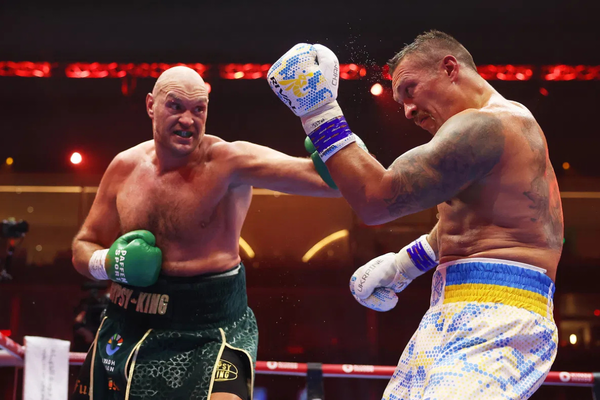
via Getty
RIYADH, SAUDI ARABIA – MAY 18: Tyson Fury punches Oleksandr Usyk during the IBF, WBA, WBC, WBO and Undisputed Heavyweight titles’ fight between Tyson Fury and Oleksandr Usyk at Kingdom Arena on May 18, 2024 in Riyadh, Saudi Arabia. (Photo by Richard Pelham/Getty Images)

via Getty
RIYADH, SAUDI ARABIA – MAY 18: Tyson Fury punches Oleksandr Usyk during the IBF, WBA, WBC, WBO and Undisputed Heavyweight titles’ fight between Tyson Fury and Oleksandr Usyk at Kingdom Arena on May 18, 2024 in Riyadh, Saudi Arabia. (Photo by Richard Pelham/Getty Images)
Most people think Tyson Fury coming in at 281 pounds for the Oleksandr Usyk rematch last week was a mistake and led to his loss. After all, ‘The Gypsy King’ was nearly twenty pounds heavier than their historic first clash earlier this year. This is why many feel that Fury’s extra mass slowed him down, especially in the latter rounds. But, there was a solid, tried-and-tested reason for this, which verbose UFC analyst Chael Sonnen discussed on his official YouTube channel.
“It was a hell of a fight. But [combat sports journalist] Kevin Iole corrected me on something,” ‘Uncle Chael’ told fans. “He said ‘Chael, this is not the first time Tyson’s done this [come in 20 pounds heavier for a rematch].’ Tyson fought Wilder, it was a competitive fight. When Tyson rematched Wilder, he put on 20 pounds.”
This is indeed true. The first time Fury fought the then-WBC heavyweight champ Deontay Wilder in 2018, he weighed 256 pounds, and fought to a draw with ‘The Bronze Bomber’. But in their rematch, Fury came in at 273, significantly heavier than their first fight. Why? “Cuz strategically he thought he needed to be bigger to absorb punches and he thought he could go bully him more. And the second match that Fury had with Wilder, he walked through him, he smashed him,” ‘The American Gangster’ added.
ADVERTISEMENT
Article continues below this ad

via Imago
Tyson Fury walks around the ring during the Tyson Fury vs Tom Schwarz 12-round Heavyweight boxing match, June 15, 2019 at the MGM Grand Garden Arena in Las Vegas, NV. PUBLICATIONxINxGERxSUIxAUTxHUNxONLY LAV2019061504 JAMESxATOA
Of course, Fury dominated his second Wilder fight, using all that extra weight on the American and his skinny legs in the clinch to tire him out. Fury’s game plan had also changed since the first fight as he abandoned his slick, hit-and-don’t-get-hit strategy in favor of a much more belligerent, all-offense game plan. This, of course, raises one very important question.
ADVERTISEMENT
Article continues below this ad
Why did Tyson Fury’s weight strategy didn’t work against Usyk?
The main reason Fury couldn’t do a Wilder on Usyk in the rematch is that the Ukranian is miles ahead of ‘The Bronze Bomber’. By this, we mean that Usyk is a brilliant technical boxer with a frighteningly high Fight IQ. Wilder, on the other hand, was mostly a “one-trick pony,” as the legendary James Toney put it.
Armed with the most devastating right hand this side of George Foreman, Wilder didn’t need to develop boxing skills. Instead, he relied on his concussive power, with his entire game plan being for his devastating right hand to find his opponent’s chin sometime during the fight. “These guys have to be perfect for 12 rounds, I only need to be perfect for two seconds, and then, in the blink of an eye, it’s bam, baby, goodnight!” Wilder once said, which is also the perfect encapsulation of his entire approach to his fighting.
ADVERTISEMENT
Article continues below this ad
But that was before Wilder fought someone of Fury’s world-championship caliber. After their first fight, ‘The Gypsy King’ was able to work out exactly how to prevent Wilder from landing his right hand -mostly by tiring him, and making him go backward so that he couldn’t generate much force for his punches.
What’s your perspective on:
Did Tyson Fury's weight gamble backfire against Usyk, or was it just Usyk's brilliance?
Have an interesting take?
But Usyk, seemingly well aware that Fury was looking to do this in their rematch, planned and prevented this. However, that doesn’t mean that Fury was wrong in trying to do it in the rematch. It just didn’t work because of Usyk’s sheer brilliance. What do you think about Chael Sonnen’s explanation for Fury coming in heavier for the Usyk rematch?
ADVERTISEMENT
ADVERTISEMENT
ADVERTISEMENT
ADVERTISEMENT


Did Tyson Fury's weight gamble backfire against Usyk, or was it just Usyk's brilliance?